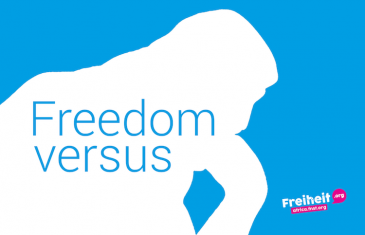Are we free to define our own identity and the way we are perceived by others? Race, gender, purported lived experiences, privilege, victimhood - who decides whether or not we form part of a particular social group? What purpose does social group classification serve? And does a person’s alleged affiliation to a particular social group give them more moral authority to speak on certain topics (or perhaps even on all topics), than others who are said not to belong to the social group in question? What tensions exist between group and individual identity? Brought to you by the Friedrich Naumann Foundation for Freedom.
Read moreIs taxation theft and slavery? Is the state justified in taking away resources that appear to belong to someone effectively to redistribute these to someone else or to society as a whole? Or is taxation better thought of as a kind of social due, which goes toward contributing to the society and its institutions which enabled the accumulation of resources in the first place? This social due might also be seen to be contributing to a society in which the most vulnerable receive basic goods and services. Brought to you by the Friedrich Naumann Foundation for Freedom.
Read moreShould we be free to move across national borders as and when we please, without any restrictions? Or should states be free to decide who may and who may not enter their respective territories? How do we resolve the tension between these conflicting freedoms? Brought to you by the Friedrich Naumann Foundation for Freedom.
Read moreIf land was wrongfully seized from a person, justice would seem to demand appropriate compensation for such a transgression. Evidently, this kind of scenario is of great relevance to South Africa given its long history of land dispossession. How has South Africa fared in its land reform efforts? What, if any, is the relationship between land and freedom? Is land seen as a proxy for economic status in South African political debate and, if it is, is this a good proxy? Brought to you by the Friedrich Naumann Foundation for Freedom.
Read moreShould the state be able to decide what substances we may or may not put in our bodies? Or should we be free to make such decisions ourselves? What do we do about the tension between the freedom to decide to take a drug in the first place and the fact that an addictive drug may actually take away a person’s capacity to make free choices in future? If the state should play a role in respect of drugs, or at least in respect of some drugs, what kind of role would be appropriate? Brought to you by the Friedrich Naumann Foundation for Freedom.
Read moreFreedom of religion is taken to be a foundational kind of freedom. What role, if any, should the state play when it comes to religion? And how, if at all, should religion be incorporated in schools? Gwen Ngwenya and Mark Oppenheimer consider these questions by carefully examining the relationship between freedom and religion. Brought to you by the Friedrich Naumann Foundation for Freedom.
Read moreWhat does justice require in terms of wrongs committed in the past or in terms of inequality of opportunity? If justice demands compensatory or corrective measures, is there any tension at all between affirmative action and freedom? Gwen Ngwenya and Mark Oppenheimer explore different affirmative action models and how these stack up against each other, delving into the often glossed-over but very important nuances of the topic. Brought to you by the Friedrich Naumann Foundation for Freedom
Read moreShould there be any limits on free speech? If there should be restrictions, how do we determine where these ought to be placed? In this episode, Gwen Ngwenya and Mark Oppenheimer offer nuanced discussion around these questions. They also examine why we should value free speech in the first place. Brought to you by the Friedrich Naumann Foundation for Freedom.
Read more

